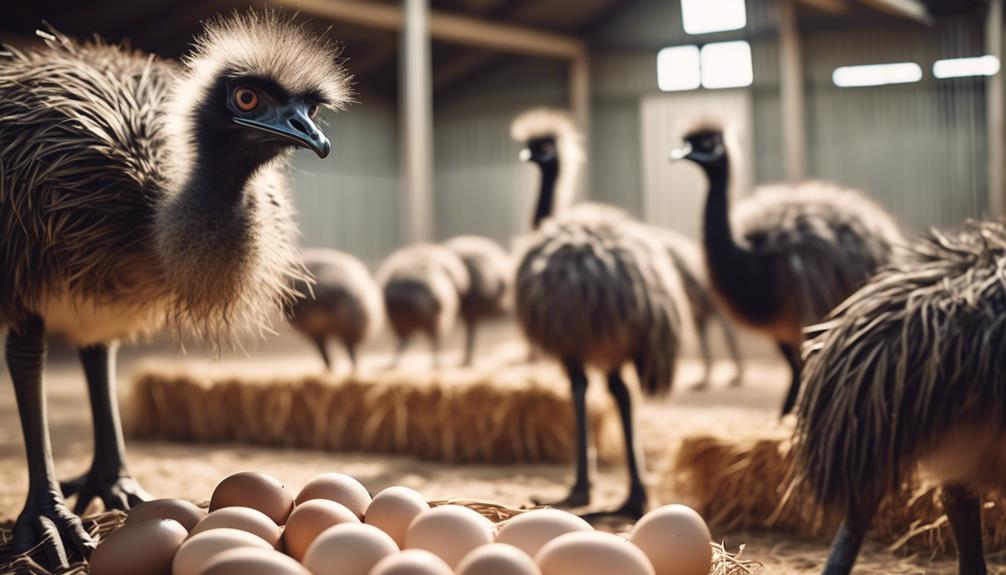
Imagine waking up at the crack of dawn, with the sun just beginning to peek over the horizon. As an emu farmer, your day is filled with a unique blend of challenges and rewards.
From tending to the needs of these majestic birds to navigating the intricacies of the emu farming industry, your work is both demanding and fulfilling.
But what exactly does a day in the life of an emu farmer entail? How do you overcome the hurdles that come your way? And what makes it all worthwhile?
Get ready to step into the shoes of an emu farmer and uncover the fascinating world of these flightless wonders.
Key Takeaways
- Effective emu breeding techniques and careful monitoring are essential for successful emu farming.
- Providing proper shelter, heat sources in cold weather, shade, and fresh water in hot weather is crucial for the health and well-being of emus.
- Ensuring a balanced and nutritious diet, including vegetables, fruits, grains, and grit, is important for emu health and breeding success.
- Marketing emu products requires strategic planning, highlighting their unique qualities, targeting specific markets, and utilizing online platforms and social media for promotion.
Early Morning Chores
When you wake up bright and early on an emu farm, your first task is to tackle the early morning chores. As an emu farmer, you understand the importance of starting your day off right to ensure the well-being of your emus. One of the key aspects of early morning chores is implementing effective emu breeding techniques. Breeding emus requires careful planning, monitoring, and record-keeping. By understanding the genetics and behavior of these magnificent birds, you can make informed decisions to improve the overall quality of your flock.
However, the impact of weather on early morning chores can't be overlooked. Emus are resilient creatures, but extreme weather conditions can affect their health and well-being. Harsh winters or scorching summers require extra care and attention. During cold weather, you need to provide shelter and heat sources to keep your emus warm and protected. On the other hand, during hot weather, it's crucial to ensure they've access to shade and fresh water to prevent heat stress.
Managing early morning chores on an emu farm requires dedication, knowledge, and adaptability. By implementing effective emu breeding techniques and considering the impact of weather, you can ensure the health and happiness of your emus, setting the stage for a successful day on the farm.
Feeding and Watering the Emus
Now that the early morning chores are taken care of, it's time to focus on the essential task of feeding and watering your emus.
Emu feeding techniques play a crucial role in maintaining the health and wellbeing of these magnificent birds. Emus are herbivores, so their diet primarily consists of plants, seeds, and grasses. Providing a balanced and nutritious diet is key to their overall health. You can offer a variety of vegetables, fruits, and grains to ensure they receive the necessary vitamins and minerals. Emus also have a unique digestive system that requires grit or small stones to aid in the grinding of their food, so it's important to provide them with access to a grit source.
In addition to feeding, emu water supply strategies are equally important. Emus need access to fresh, clean water at all times. Ensure that they've access to a reliable water source, such as a trough or a shallow pool. It's crucial to regularly check and clean the water containers to prevent the buildup of bacteria or algae. Emus have a high water intake, especially during hot weather, so it's essential to monitor their water supply to avoid dehydration.
Maintaining the Emu Enclosures

To maintain the emu enclosures, it's crucial to regularly inspect and clean the area to ensure the optimal living conditions for these magnificent birds. Emu enclosure maintenance involves several key tasks that promote the well-being and happiness of the emus:
- Fencing: Emus are curious creatures known for their ability to jump high. It's essential to regularly inspect the enclosure's fencing to ensure there are no holes or weak spots where the emus could escape. Reinforcing the fencing regularly will help keep the emus safely contained.
- Landscaping: Emus thrive in an environment that mimics their natural habitat. Maintaining the enclosure's landscaping involves trimming vegetation, removing any potential hazards, and providing ample space for the emus to roam and forage. This creates a stimulating and enriching environment for the emus.
- Emu Behavior: Regular observation of the emus' behavior is crucial to identify any signs of stress or aggression. By understanding their behavior patterns, you can make necessary adjustments to the enclosure to ensure the emus' social and emotional needs are met.
- Socialization: Emus are social animals and thrive in groups. Encouraging socialization among the emus helps create a harmonious and well-adjusted flock. Regularly introducing new emus or rearranging the enclosure to promote social interactions can enhance their overall well-being.
Dealing With Emu Health Issues
Dealing with the health issues of emus requires diligent monitoring and prompt intervention to ensure their well-being and prevent any potential complications. As an emu farmer, it is essential to be aware of the common health concerns that can affect these magnificent birds. Regular veterinary care is crucial in maintaining their overall health and addressing any issues that may arise.
To help you better understand the various health concerns of emus, here is a table summarizing some common ailments and their corresponding symptoms:
| Health Concern | Symptoms |
|---|---|
| Respiratory Issues | Coughing, wheezing, difficulty breathing |
| Skin Problems | Feather loss, skin lesions, itching |
| Parasites | Weight loss, feather damage, irritability |
| Nutritional Disorders | Poor growth, weakness, dull feathers |
Should you notice any of the symptoms mentioned above, it is crucial to seek veterinary care immediately. Emus can be susceptible to various diseases and conditions, and early intervention is key to their recovery.
In addition to regular veterinary check-ups, maintaining proper hygiene and a balanced diet for your emus is essential in preventing health issues. Clean enclosures, fresh water, and a diet rich in nutrients will help keep your emus healthy and thriving.
Emu Breeding and Egg Incubation

As an emu farmer dedicated to the health and well-being of your magnificent birds, it's important to understand the process of emu breeding and the intricacies of egg incubation. Here are some key techniques and methods to help you successfully breed and incubate emu eggs:
- Breeding Techniques: Emus are polygamous, with one male mating with multiple females. To encourage successful breeding, ensure a balanced diet for both males and females, providing them with a high-quality emu feed that's rich in protein and essential nutrients. Additionally, create a suitable breeding environment with ample space and privacy for the emus to mate comfortably.
- Egg Collection: Emu eggs are typically laid in the morning and can be collected daily. Handle the eggs with care, making sure not to rotate or shake them, as this can damage the developing embryo inside. Clean the eggs gently, removing any dirt or debris, and store them in a cool, dry place until ready for incubation.
- Incubation Methods: Emu eggs require specific conditions for successful incubation. Use an automatic incubator or an emu-specific incubator that can maintain a steady temperature of around 97.5°F (36.4°C) and a humidity level of 50-60%. Turn the eggs three times a day for the first 40 days, then stop turning them for the remaining incubation period.
- Hatching and Chicks: Emu eggs take approximately 50-55 days to hatch. Once the chicks start to pip, provide them with a warm, clean brooder that's well-equipped with food and water. Monitor the temperature and humidity levels to ensure the chicks are comfortable and healthy.
Marketing and Selling Emu Products
When it comes to marketing and selling emu products, it's crucial to have a strategic approach that highlights the unique qualities and benefits of these remarkable bird-based products. Emu product marketing involves promoting the various uses of emu oil, meat, and feathers, as well as emphasizing their natural and sustainable qualities.
One effective strategy is to educate consumers about the health benefits of emu oil, such as its anti-inflammatory and moisturizing properties for skincare and haircare products. Additionally, emphasizing the lean and nutritious qualities of emu meat can appeal to health-conscious consumers looking for an alternative to traditional meats.
Emu product distribution is another key aspect of marketing. Developing partnerships with local retailers, health stores, and beauty salons can help increase the availability of emu products to consumers. Online platforms and e-commerce websites can also play a significant role in reaching a wider audience. Utilizing social media platforms, such as Instagram and Facebook, can help create a community of loyal customers who are passionate about emu products.
To stand out in a competitive market, it's essential to differentiate your emu products from others. Highlighting the sustainable and ethical practices of your farm can resonate with environmentally conscious consumers. Sharing testimonials and success stories from satisfied customers can also help build trust and credibility.
Managing Finances and Budgeting

To effectively manage your finances and budget as an emu farmer, it's important to develop a strategic plan that accounts for all expenses and maximizes profitability. Financial planning and cost analysis play a crucial role in ensuring the success of your emu farming venture.
Here are four key steps to help you manage your finances effectively:
- Track and categorize expenses: Keep a detailed record of all your expenses, including feed, veterinary care, equipment, and labor costs. Categorize them to identify areas where you can potentially reduce spending.
- Create a budget: Based on your expense tracking, create a monthly or yearly budget that outlines your expected income and expenses. This will help you allocate your resources efficiently and avoid overspending.
- Monitor cash flow: Regularly review your cash flow to ensure that you have enough funds to cover your expenses and maintain a healthy financial position. Consider implementing strategies to improve cash flow, such as adjusting payment terms with suppliers or offering discounts for early payment from customers.
- Analyze profitability: Conduct regular cost analysis to determine the profitability of your emu farming operations. Compare your revenue against your expenses to identify areas where you can increase profitability, such as optimizing feed efficiency or diversifying your product offerings.
Emu Farming Regulations and Compliance
After successfully managing your finances and budget as an emu farmer, it's crucial to understand the regulations and compliance requirements that govern the emu farming industry. Emu farming sustainability and the growth of the industry depend on adhering to these guidelines. As an emu farmer, it's your responsibility to comply with these regulations to ensure the well-being of your emus and the environment.
To begin with, it's essential to be familiar with the local, state, and federal regulations that govern emu farming. These regulations may cover areas such as animal welfare, biosecurity, record-keeping, and waste management. By understanding and following these rules, you can contribute to the sustainability of the emu farming industry.
In addition to regulatory compliance, it's also important to stay informed about the latest industry standards and best practices. This knowledge will help you stay ahead of the curve and adapt to the changing needs of the market. By keeping up with industry trends and advancements, you can position yourself for growth and success in the emu farming industry.
Furthermore, networking with fellow emu farmers, industry associations, and regulatory bodies can provide valuable insights and resources. By actively engaging with these stakeholders, you can stay updated on any changes in regulations and compliance requirements, as well as access support and guidance when needed.
Emu Farmer's Personal Satisfaction and Rewards

As an emu farmer, you can experience a sense of personal satisfaction and reap rewarding benefits from your dedication and hard work in the industry. Here are four reasons why being part of the emu farming community can bring you emotional well-being:
- Connection with nature: Emu farming allows you to spend your days surrounded by the beauty of nature. Interacting with these majestic birds and witnessing their growth and development can bring a deep sense of fulfillment.
- Independence and self-sufficiency: As an emu farmer, you have the opportunity to be your own boss and take charge of your business. The freedom to make decisions and see the direct impact of your actions can be immensely satisfying.
- Contribution to conservation: Emu farming plays a crucial role in the conservation of this unique species. By raising emus, you're actively participating in the preservation of their genetic diversity and ensuring their survival for future generations.
- Community support and camaraderie: The emu farming community is a tight-knit group that offers support, knowledge-sharing, and camaraderie. Being part of this community not only provides valuable insights but also fosters a sense of belonging and connection with like-minded individuals.
Emu farming offers not only financial rewards but also a deep sense of personal satisfaction and emotional well-being. So, embrace the challenges and rewards of this industry, and experience the joy of being an emu farmer.
Frequently Asked Questions
How Much Profit Can Be Generated From Selling Emu Products?
You'll be surprised by the profit potential of selling emu products. The market demand for these unique items is growing, offering you a great opportunity to make a substantial income from your emu farming business.
What Are the Legal Requirements for Starting an Emu Farm?
To start an emu farm, you'll need to navigate through various legal requirements. This includes obtaining permits, licenses, and complying with governmental restrictions. One example is ensuring compliance with emu farming regulations to ensure a successful and legal operation.
How Long Does It Take for Emu Eggs to Hatch?
Emu eggs typically take around 50-55 days to hatch. To ensure successful hatching, emu farmers use various breeding techniques and maintain specific incubation temperature requirements. It's an exciting process to witness!
What Are the Most Common Health Issues That Emus Face?
Emus, like any other animals, face potential health issues. It's important for emu farmers to be aware of common problems such as parasitic infections, respiratory illnesses, and joint problems, and to implement proper emu farming techniques and breeding practices to ensure their well-being.
What Marketing Strategies Can Be Employed to Sell Emu Products Effectively?
To sell emu products effectively, you can employ social media promotions and influencer collaborations. These strategies help increase visibility and reach a wider audience who are looking for unique and sustainable products like yours.
Conclusion
In the vast and ever-changing world of emu farming, each day brings a unique set of challenges and rewards.
From the early morning chores of feeding and watering these majestic creatures to the meticulous task of maintaining their enclosures, an emu farmer's life is filled with dedication and hard work.
Yet, amidst the daily struggles, there's a sense of personal satisfaction and fulfillment that comes from witnessing the growth and success of these remarkable birds.
Emu farming may be demanding, but the rewards are truly extraordinary.




